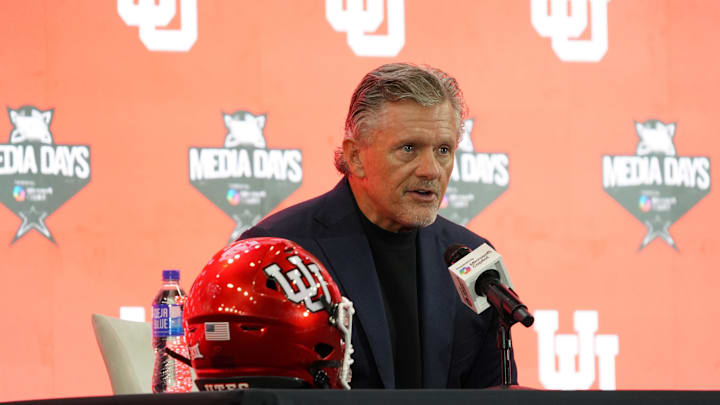More and more coaches across college football are speaking out about what they perceive as an uneven playing field in terms of what some programs are able to spend. It was a major theme at Big 12 Media Days last week with Colorado's Deion Sanders and Oklahoma State's Mike Gundy vocally calling for changes.
You can now add Utah's Kyle Whittingham to the list.
Whittingham has seen it all during his time coaching the sport. He's the second-longest tenured head coach at one school, as he prepares for his 21st season as the head coach of the Utes and his 32nd season with the program altogether.
He coached at Utah when they were just a Group-of-Five school, ushering them into the Power-Five in the PAC-12 in 2011 - winning two conference titles - and into the Big 12 last season. He's used to there not being a level playing field for his program against the others, but the divide just keeps growing larger even after Utah's move into power conference football.
He, like other coaches in the Big 12, can feel the conference falling further and further behind the SEC and Big Ten.
"There's teams that are front-loading all the extra money they had prior to the rev share kicking in," Whittingham said. "We've got teams spending supposedly $50 million or more on players, and that's five, six times what we got."
There was a mad dash of spending in recruiting and in the Transfer Portal prior to the House vs. NCAA settlement and the first legitimate guardrails being set up for NIL spending. It remains to be seen going forward, now that revenue sharing has begun and all NIL deals north of $600 having to go through a clearinghouse, if the spending waters are going to calm.
The NIL clearinghouse is nice, but most prognosticators don't seem confident that it's the cure-all for the wild spending that has taken over college sports. Most coaches are calling for additional changes and an even bigger turn towards professionalization.
Kyle Whittingham is the latest coach to call for a salary cap
Following in the footsteps of Deion Sanders, Whittingham joined a chorus of coaches calling for a salary cap in college football.
"Biggest issue is we've got to have somewhat of a level playing field with the NIL space," Whittingham said. "Bottom line, they're professionals, they're getting paid like professionals and we've got to get a handle on that. We can't have X amount of schools paying, spending $50 million on rosters and the rest of us $12 million.
"There's about 12 teams that'll have a chance to win it all every year and that's it. So I would say leveling the playing field with a salary cap, again, back to the NFL model, and making things more uniform. It works in the NFL, so why can't it work at this level?"
The truth is, programs have done whatever they could to try and gain a competitive advantage in college football since the leather helmet days. Right now, the major advantage is money. If you take that away and form a salary cap, there's still going to be under-the-table deals getting done and money flying around left and right. I don't believe any of these coaches are naive enough to believe that players started getting paid for the first time in 2021 when NIL was legalized.
Perhaps a bigger issue is that nobody believes the NCAA has any real power anymore. Nobody is operating in fear of the supposed governing body of the sport, so even if you put rules in place, it's not likely that many are going to follow.
That's why college football needs a complete overhaul. A new governing body needs to be installed, headed by a commissioner. If you want college sports to be just like pro sports, and every change in recent years has made that an emphatic yes, then you need someone in charge.
